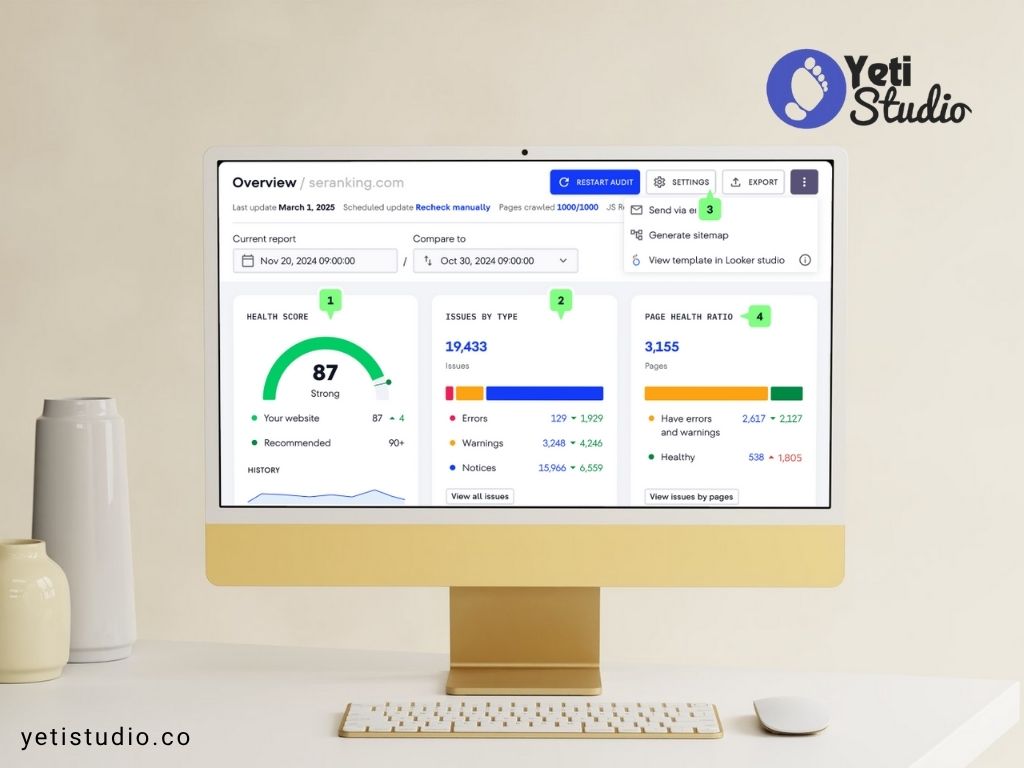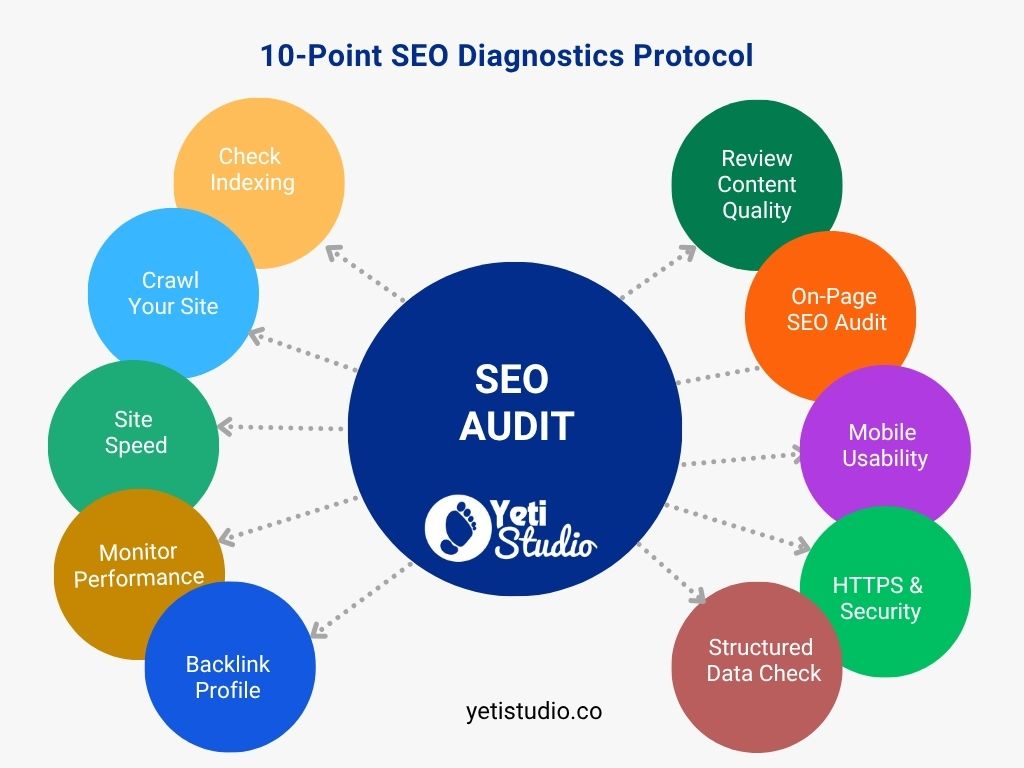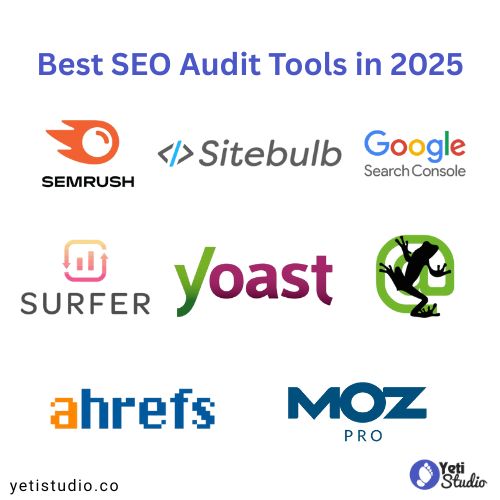In 2025, mastering SEO is more essential—and competitive—than ever. With AI-powered search engines, evolving Google algorithm updates, and rising user expectations, your website needs more than a basic checklist. It needs a comprehensive, performance-driven SEO audit to improve rankings, increase organic traffic, and maximize online visibility.
Today’s SEO audit is a strategic blueprint for improving visibility, driving traffic, and increasing revenue. This guide outlines the latest tools and strategies for a complete SEO audit that meets 2025 standards. Whether you’re a marketer, site owner, or SEO pro, deploy this to spot weaknesses, boost performance, and stay ahead of your competitors.
Table of Contents
1. What is SEO Audit?
2. Benefits of an SEO Audit
3. 10-Point SEO Diagnostics Protocol for 2025
4. Best audit tools in 2025
What is an SEO Audit?

Figure: SEO Audit Report
“SEO is not something you do anymore. It’s what happens when you do everything else right.” – Chad Pollitt
An SEO audit is a thorough examination of a website to determine how well-optimized it is for search engines such as Google, Bing, and others. The goal of an SEO audit is to identify strengths, weaknesses, and opportunities to improve the site’s visibility in search engine results pages (SERPs).
SEO audits are useful for both website owners and marketers to understand what works and what doesn’t as part of their SEO strategy. An audit identifies technical issues, content gaps, and backlink issues, to ensure your website is working in accordance with the most recent best practices of SEO. This can lead to better rankings and increased organic traffic, and ultimately, conversions.
Benefits of an SEO Audit
Performing an SEO audit might seem like a technical task, but the benefits it brings to your website and business are huge. Here’s why investing time in an SEO audit pays off:
1. Identify and Fix Technical Issues
An SEO audit reveals technical problems like slow page speed, broken links, duplicate content, or crawl errors. Fixing these ensures search engines can easily crawl and index your site, improving your chances of ranking higher.
2. Elevate UX with Speed and Fluidity Enhancements
Audits assess site speed, mobile responsiveness, and navigation. A fast, easy-to-use website maintains visitors engaged and reduces bounce rates.
3. Optimize Content to Boost Rankings
An audit checks your keyword usage, meta tags, and content quality. This enables ensure your pages target relevant keywords and offer value, making them more likely to rank well.
4. Refine Your Backlink Profile
Backlinks from reputable sites build your website’s authority. An SEO audit reviews your link profile, enabling you remove harmful links and find opportunities for quality backlinks.
5. Stay Updated with SEO Best Practices
Search engine algorithms change frequently. Regular audits enable your website stay in line with the latest SEO guidelines, preventing penalties and maintaining your site competitive.
10 Point SEO Diagnostics Protocol for 2025

Figure: 10-Point SEO Diagnostics Protocol
1. Crawl Your Website
To crawl your entire website, use tools like Screaming Frog, Ahrefs, or SEMrush. This assists you in locating redirect chains, broken links, duplicate pages, and other important technical problems.
2. Check Indexing & Coverage
To check which pages are indexed and for errors, deploy Google Search Console. Verify that no-index tags or robots.txt are not blocking any important pages.
3. Analyze Site Speed & Core Web Vitals
Use GTmetrix or Google PageSpeed Insights to test the speed of your website. Focus on LCP (Load Time), FID (Interactivity), and CLS (Visual Stability) when optimizing for Core Web Vitals.
4. Evaluate Mobile Usability
Mobile friendliness is a must with Google’s mobile-first indexing. To find and address problems with mobile design, use Google’s Mobile-Friendly Test.
5. Audit On-Page SEO
Examine header structure, internal linking, meta descriptions, title tags, and keyword placement. Make sure your content is readable, properly formatted, and optimized for your target keywords.
6. Review Content Quality
Examine content that is thin or out-of-date. Low-performing pages can be updated, merged, or deleted. As part of Google’s quality standards, pay close attention to E-E-A-T (Experience, Expertise, Authoritativeness, Trustworthiness).
7. Analyze Backlink Profile
Examine your backlink profile using Ahrefs or SEMrush respectively. Find lost backlinks, spammy links, and chances to build new, high-authority links.
8. Check for HTTPS & Security Issues
Use HTTPS to make sure your website is completely secure. Resolve any outdated SSL certificates or mixed content warnings.
9. Test Structured Data (Schema Markup)
To verify that your pages properly deploy schema markup, deploy Google’s Rich Results Test. Rich snippets in search results help increase CTR.
10. Monitor SEO Performance
Utilize Google Search Console and Google Analytics to monitor keyword rankings, organic traffic, and crawl statistics. Establish goals and conduct a monthly performance review.
Best audit tools in 2025

Figure: Best audit tools in 2025
1. Google Search Console (Free)
Why it’s so good: straight from Google. aids in locating crawl errors, indexing issues, performance metrics, and mobile usability issues.
2. Screaming Frog SEO Spider (Free up to 500 URLs / Paid)
Why it’s so good: thorough technical search of your website. detects missing meta tags, duplicate content, broken links, redirects, and more.
3. Ahrefs Site Audit (Paid)
Why it’s so good: robust crawl engine and a tidy user interface. identifies more than 100 SEO problems and provides thorough advice.
4. SEMrush Site Audit (Free trial / Paid)
Why it’s so good: provides a concise “Site Health Score” with issues categorized. incorporates backlinks, keyword data, and position tracking.
5. Sitebulb (Paid)
Why it’s so good: intuitive, visually appealing audit reports. Excellent at communicating technical problems to teams or clients.
6. urfer SEO Audit Tool (Paid)
Why it’s so good: integrates audit insights with content SEO. makes recommendations for structural enhancements, content length, and keyword density.
7. Yoast SEO (for WordPress) (Free/Paid)
Why it’s so good: On-page audit recommendations in real time for readability, meta, titles, and other areas.
8. Moz Pro Site Crawl (Paid)
Why it’s so good: Clear dashboard with simple-to-use problem tracking. Good compatibility with the keyword tools offered by Moz.
Conclusion
In 2025, maintaining an advantage in a competitive online environment requires a comprehensive SEO audit. It keeps your website in line with changing search engine algorithms, enhances user experience, optimizes content, and helps find technical problems. Better rankings, more organic traffic, and greater online authority are the results of routine audits.
Finding growth prospects and addressing hidden issues before they affect the functionality of your website are made possible by using the appropriate tools and adhering to a thorough audit process.
At Yeti Studio, we specialize in professional SEO audits and tailored tactics that increase the visibility and yield results of your website. We can help you expand your business and raise your search engine rankings.
Reach out to Yeti Studio right now to begin your SEO adventure and rule the search results in 2025.
Also, visit the following pages you may like:
The Ultimate Guide to SEO and SEM: Key Differences
Tap Into The Magic Of Local SEO: An In-Depth Guide
Best SEO Link Building Tools to Boost Your Website
Why hiring an SEO expert in Nepal is crucial for businesses?
Mobile Number: 977-9808271089 (WhatsApp)
Email Address: info@yetistudio.co
Address: Baraha Marg, Dhumbarahi, Kathmandu, Nepal






 using WordPress and
using WordPress and
Comments are closed